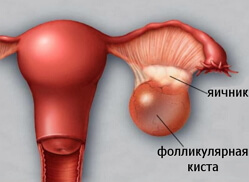Can I have an abortion on my first pregnancy?
 The first pregnancy that ends with abortion is very risky, sometimes it can lead to infertility of a woman.
The first pregnancy that ends with abortion is very risky, sometimes it can lead to infertility of a woman.
Such an operation as abortion can cause a violation of the reproductive capacity of the woman's body.
If the first pregnancy has been undesirable for you, then before you have an abortion, think carefully: you will inflict a significant trauma on your body, which in future will probably not allow you to have children.
Why is the first abortion especially dangerous, and what are the risks of abortion during the first pregnancy? During pregnancy in the body of a woman hormonal transformation of the body's work occurs, and a sharp termination of it can cause difficult to treat hormonal disorders. Another reason is the internal mucous membrane of the woman's uterus, which did not give birth, is too thin, therefore it is possible to break the wall of the uterus, and this will prevent pregnancy in the future. And, unfortunately, no one is guaranteed against infection in the uterus during an abortion operation. In this case, after an abortion, an obvious or hidden inflammatory process begins.
The results of the first abortion can be the phenomenon of infertility, miscarriage, complicated pregnancy.
Legal and illegal abortion
Experts note that the incidence of infertility is much higher in those cases if the operation was conducted illegally, that is not within the walls of a medical institution that has the right to conduct such operations. After abortions, which are made in clinical conditions, the probability of becoming infertile appears only in 10% of women. However, most of these 10% fall on abortion during the first pregnancy.
In case of illegal abortion, infertility occurs 4 times more often - this means that almost half of women who decide on such abortion will not be able to give birth in the future. Clandestine abortions are often made by unmarried young girls, as well as women who have fallen into unfavorable social conditions. Some of the girls are afraid to go to the clinic and then they put themselves at great risk at home: they inject various chemical substances into their vagina, which must provoke a miscarriage, inject toxic solutions that kill the embryo. Is it possible to have an abortion? Everyone from the moral point of view finds the answer himself. But if a woman decides on this step, then it is definitely preferable to apply to a special medical institution.
The most terrible thing a pregnant woman can face is illegal abortion and abortion with the help of "folk" remedies. It is also dangerous to terminate the pregnancy on longer terms( more than 12 weeks).In this case, during the operation, there may be various damages to the uterus - for example, the bones of a large fetus. These bones can easily pierce the uterus. Therefore, when the abortion is late, the cervix is expanded more than usual, which in the future can lead to negative changes.
The most sparing, with the least negative consequences, is abortion, which is done by highly qualified specialists in various official institutions, for a period not exceeding 8-9 weeks.
Reasons for the violation of reproductive functions
The main reason for the violation of the reproductive activity of a woman is harm that causes the female body to scrape the uterine cavity. After these actions, the uterine cavity and neck are injured. In addition, drugs used in operations can cause negative changes in the flora of the vagina. In addition, after abortion there are serious hormonal problems: with the menstrual cycle, ovulation, conception.
In addition, the risk of infertility increases if as a result of abortion there are inflammatory diseases. And, of course, abortions very often cause irreversible changes in the uterus and fallopian tubes, because of which the pipes may lose mobility. There are spikes in them that interfere with the movement of the eggs.
Consequences of abortion
Is it possible to have an abortion during the first pregnancy - this question supposedly implies that subsequent abortions will be tolerated more easily. However, this is a very erroneous idea. Repeated interventions in the uterus during the next abortion lead to even more inflammatory problems, and can also cause endometriosis. However, it is known that in young women who have not yet given birth, the risk of disease is higher. This risk is also called the first operational risk. During the first abortion, there is even a risk of death.
Enlargement of the cervix by "force" - the manipulation that occurs during abortion leads to the fact that during the next pregnancy the cervix can open itself, causing a miscarriage. If doctors detect a woman's risk of miscarriage, at the gestation period of 14 weeks she gets a suture on the cervix, which is removed before delivery.
The risk of infertility after abortion increases the inflammation of the genitals, endocrine problems, frequent changes in sexual partners( in this case, the risk of STDs increases significantly), early onset of sexual life, endometriosis, persistent stress, depression, unhealthy lifestyle, bad habits.
What to do for women who have had an abortion
If a woman decides to have an abortion, then she must take care of herself after him. The next day after the abortion, it is worth to appear to the gynecologist. He should monitor the status of the woman's uterus, and also prescribe funds for the prevention of hormonal disorders and inflammatory processes. He also has to take care to offer the woman the best way for her to contraceptive for the future. It should be remembered that next month after the abortion the next pregnancy may occur.
During the first week after the abortion, a woman should pay close attention to her health condition, try not to miss possible complications. Doctors also recommend for some time to refrain from sex. It is better if a woman does not smoke and drink alcohol. To avoid depression and prolonged stress, it is worth taking care of getting positive emotions.



